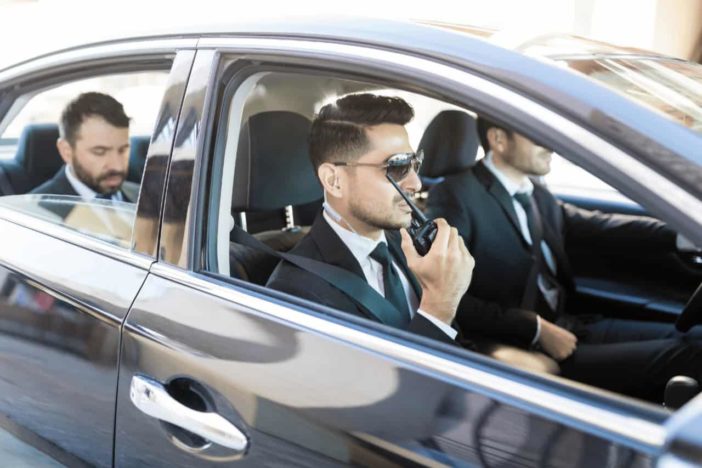Just about most movies or TV shows aired has a protagonist that has to evade the law or avoid armed threats will have their certain demands and requirements laid out. And they just so happen to be very similar to those demanded by the security and law enforcement sectors, so the general public has an easier time relating to characters in those scenarios than to actual protection professionals.
But then, forgiving Hollywood for the misrepresentation of real-life events for entertainment purposes, any business executive or VIP, with the need for personal security detail, would understand and appreciate a security agent’s work. It isn’t always flashy lights and cameras. These professionals put in the work and, obviously, their lives on the line to ensure the safety of their clients.
However, not everyone might know much about what they do. Hopefully, this guide will help clear up some of the misconceptions most people have about protecting VIPs.
The Reality of VIP Executive Protection
Moving to the real-world scenario, there are a few things that a VIP protection specialist may not disclose. Although there are various misconceptions about this profession and how it works in the beginning, when taken in the proper context, it is an important and demanding job. First of all, the term “Executive Protection” applies only to the highest level of personal security for mostly those in the corporate, legal, and financial industries.
It’s also one of the highest paying and sought-after careers in the private security industry, according to the Bureau of Labour Statistics, because of the nature of the risks the clients often have to take when they venture out into society. Second, don’t expect to be walking around all day with a 9mm, baton, and taser, posing as a tough guy.
Of course, this job entails protection, but it goes beyond combat. For example, an executive protection (EP) agent must know how to provide first aid and CPR in the event of an emergency.
Why Do VIPs Require Protection?
According to the Department of Defence, military VIPs travel to countries with “dissident factions or states that cannot be trusted to respect the life and property of the high-ranking member.”
So, if there is a thought of wanting to become a VIP protection agent, think again. Although several jobs are involved in the security realm, including bodyguards, drivers, investigators, and even bounty hunters, when it comes to VIP protection, it’s just too big a responsibility.
As the saying goes, with great power comes great responsibility. The real VIPs have a lot of problems on their hands that a bodyguard may not be able to help. In fact, because of this, they often are better off using an outside agency with expertise in these situations.
A VIP may need security in the following situations:
- If they become the target of an armed assassination attempt
- If they come into conflict with a politically unstable region
- If they need to make a quick exit from an area or be escorted to and from an airport
- If they need to take precautions against kidnapping
- If they need to stay anonymous
- If they need to be protected against criminal organizations and organised crime groups
- If they are working with a sensitive government or foreign policy issue
An EP agent needs to be cautious and not place a VIP in harm’s way. Many situations arise in which a person’s life can be on the line if an act of terrorism occurs. There have been instances where security agents have foiled attempted attacks on VIP personnel. In other situations, the individual sustains an injury that demands immediate medical attention. With the help of EP agents, the situation becomes less tragic.
Kidnappings are on the rise in some nations. Certain criminal elements have turned this crime into a money-making enterprise as they target high-profile persons. To avoid becoming a victim, a VIP must engage the best security detail available.
Must-Have Skills for EP Agents
A VIP executive protection agent is almost considered a jack of all trades, from driving to combat. For a start, there is a need to undergo fundamental security training and obtain a license. These are likened to scratching the surface. More requirements include understanding:
- Cardiopulmonary resuscitation (CPR) Level C
- Automated external defibrillator (AED) training
- Emergency first aid, from extended to standard
- Pre-hospital care training (in some cases)
- Professional driving skills and certification
- Firearm training, license, and insurance (depending on the country)
- Effective communication skills
It isn’t all about slamming people into walls or headbutting them in the nose when it comes to VIP executive protection. Strong communication skills are required to grasp the meaning behind words and recognize when a threat is imminent.
VIP Executive Protection Principles
A high-profile individual requires the best security detail, which means that the EP agents are to adhere to the following principles to keep their clients and themselves safe.
Protection
This industry’s principal objective is to keep VIPs safe. Hence, an EP security team will need to use protective gear and equipment when in transit, including bulletproof vests and vehicles.
Deterrence
In many cases, an EP agent is available to deter any attempts by criminal or terroristic elements to commit crimes against a VIP by instilling fear into them. In other words, the team will need to have “tough guy” attitudes. This doesn’t mean that the team members will need to be violent all the time, but they will be in a position to stop the violence when it occurs.
Access Control
VIPs are the most secure targets in an attack. There is a need for an EP team to ensure that they are the only ones with access to the VIP. This ensures that anyone who wishes to harm the VIP would have to get through very difficult and stringent security.
EP agents are present with VIPs during large events, business conferences, and political meetings, and ensure to follow this principle. Among other things, they:
- Scan the public for potential threats
- Restrict the presence of weapons within the VIP’s vicinity
- Remove harmful objects close to VIPs
- Check meals served to the VIPs
- Implement technologies and devices to prevent an attack
VIP EP Benefits
Although VIP EP services are highly demanding, the benefits are tremendous. Agents earn $70,000 on average. Other perks include access to:
- Luxury vehicles
- Five-star dining
- Highly sought-after gadgets
- High profile people and gatherings
- Luxury travel
Conclusion
VIP executive protection is a profitable profession for anyone searching for secure employment in the security business. Among other things, it accommodates a variety of work schedules; agents can work full-time, part-time, or even for short periods. In addition, it necessitates security training and certification, as well as the capacity to effectively communicate. After getting their foot in the door, candidates can begin working as professional EP agents.





